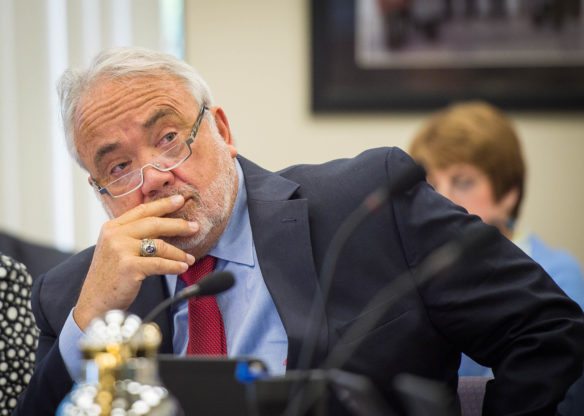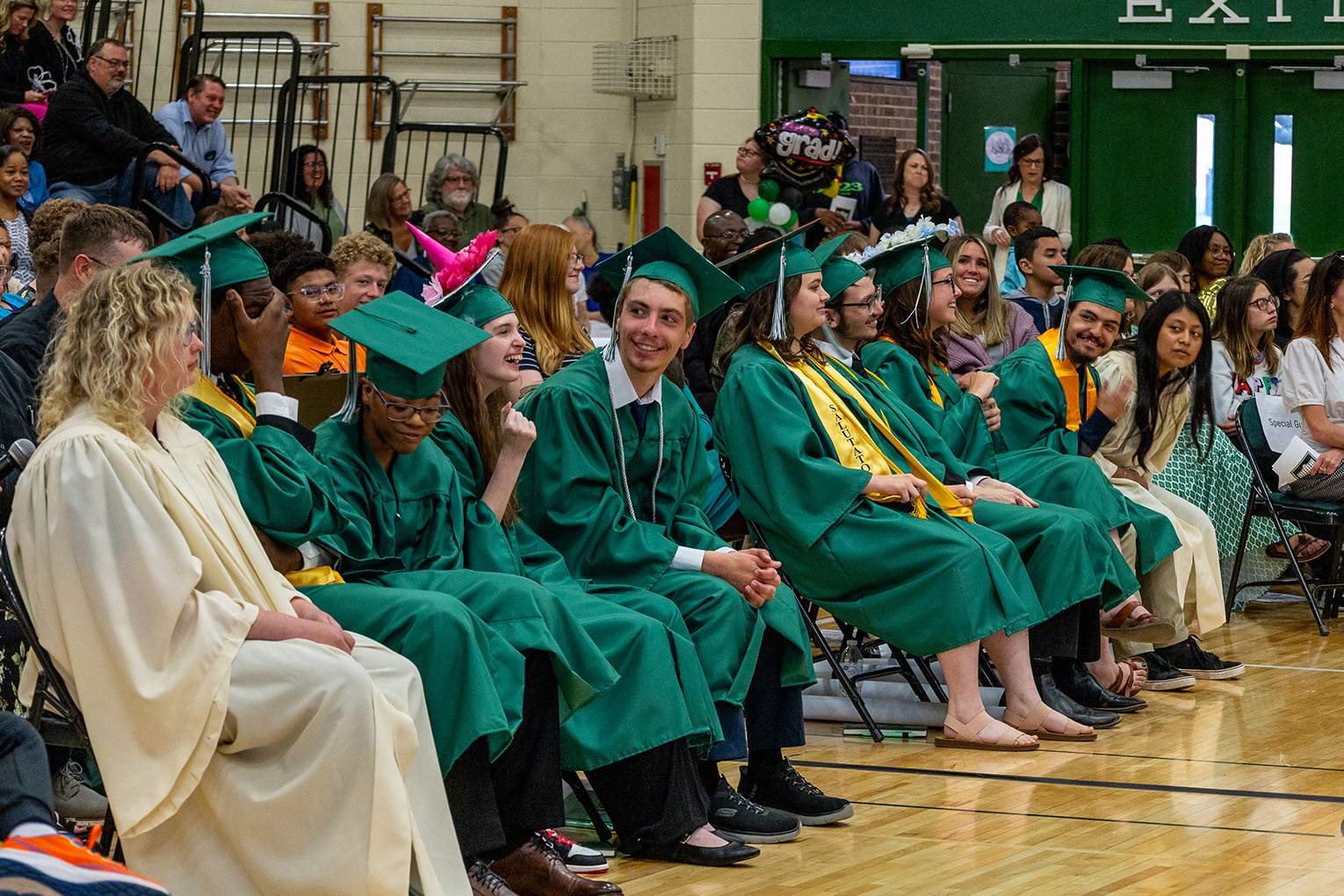
Ben Cundiff, one of five new members of the Kentucky Board of Education, has a long history of devoting his time to education causes. He has served on the boards of the Prichard Committee for Academic Excellence, The Fund for Transforming Education, Kentucky Governor’s Scholars Foundation and the Early Childhood Advisory Council, among others.
By Jennifer Ginn
Jennifer.ginn@education.ky.gov
Ben Cundiff may be a chemical engineer by training, but it’s the reactions in the classroom that lead to great education that have always interested him.
Cundiff, the owner/operator of Cundiff Farms in Cadiz, has a long history of devoting his time to education causes. He has served on the boards of the Prichard Committee for Academic Excellence, The Fund for Transforming Education, Kentucky Governor’s Scholars Foundation, the Early Childhood Advisory Council, The Center for Gifted Studies at Western Kentucky University, The Gatton Academy and the Kentucky Chamber of Commerce. He also has served on the boards of the Community Foundation of Middle Tennessee, the Nashville Symphony and two charter schools located in some of the most economically challenged areas of Nashville.
Cundiff said he is eager to continue his efforts to improve education in the Commonwealth as one of five people sworn in earlier this summer as new members of the Kentucky Board of Education.
He is a graduate of the former Kentucky Military Institute in Louisville. He holds a bachelor’s degree in chemical engineering and a law degree from Vanderbilt University.
Kentucky Teacher staff had a chance recently to ask Cundiff about his priorities while serving on the Kentucky Board of Education. Here’s what he had to say.
Why were you interested in serving on the Kentucky Board of Education?
“I talked to several friends of mine who have been on it. They seemed to think it was a chance to make real change. It’s an obligation that everybody has if they’re asked to be on it. It seemed like one of those things you shouldn’t pass up if you have the capacity to show up for the meetings and do the work.”
What impact do you hope to have on the board?
“For one thing, I hope I can bring my insight on the smaller, more rural schools. There are lots of things that happen in the school world in the golden triangle that never really make it to outposts like where I am. I think it would be nice if some of the most under-resourced areas at least had information about what’s going on in the education system and in addition to that, perhaps got to participate in some of the things that happen.”
Other than more money, what do Kentucky schools need most?
“I think, ultimately, they need to convince the parents of the importance of education. There’s a certain sales job that needs to go on there.
“Frankly, I believe that the answer in the long run will be to become more like Finland or South Korea or Singapore, where the teacher pool comes from the top 15 percent of the graduates from the best universities. It’s very competitive for the jobs and they pay like a professional engineering job, for instance. To translate it into Kentucky terms, I kind of see a future somewhere down the road where it’s very competitive to get a teaching job and when you do, you would start at maybe $80,000 instead of $30,000. You’d have the respect that you deserved, but you’d have the ability that comes from being that high up in your class in college.”
What are the biggest challenges facing Kentucky’s schools?
“I think one of the biggest challenge is for the legislature to give more priority to education in Kentucky. It’s funded differently than it was funded in 1990 when the school laws changed. Given inflation and the issues schools have to deal with, it seems to be more and more inadequate. The legislature funds a lot of priorities higher than education, which I think is totally wrong.”
What small change would have the greatest impact on Kentucky’s schools?
“I think one small change that would really be helpful but is probably largely overlooked would be for school guidance counselors to be freed of all of the other things they do to allow them to help students focus on being prepared for college and being able to stay there when they get there. We need more guidance counselors and we need to free them of all the administrative stuff that they have to do that is not guidance counseling.”
What major change would you make to improve Kentucky schools?
“I think the major changes, all of these things, cost money. Money won’t solve it, but you have to increase the preparation of the teacher core. I think if we don’t recognize that it’s important enough to apply more of our resources to education, then we’ll continue to be toward the bottom of the list in education.”
Other than parents and teachers, what do you believe has had the biggest impact on Kentucky students’ education in the past few years?
“This is kind of a macabre way to look at it, but I think the change in the world of jobs. It’s made people realize that we have to do something different than what we have done so far. I think Einstein said insanity is doing the same thing over and over again and expecting a different result. We’re doing a lot of things like we did 100 years ago, hoping for a different result.
“Even if you’ve been living under a rock, you realize that we now compete with people all around the world. They say of all the jobs that disappeared in 2008 and 2009, 40 percent of them have either been exported, automated or digitized and there are people standing around waiting for those jobs to come back. Those jobs aren’t coming back. People have to be prepared with different skills. I think as that starts to slowly dawn on people, that’s probably had the biggest impact on where we’re going in education.”
What could have the biggest impact on education in the future?
“I think that’s businesses. I think businesses have finally looked the bear in the face in terms of realizing that the education system is not putting out the people the businesses need for what they have to do to compete in the world. Businesses have gotten smacked so hard by that, I think they’re willing to take their time and their money to try to help cooperate with the educational process to everybody’s benefit.”
One of the Kentucky Department of Education’s priorities is to address the achievement gap. How do you think we can do that?
“I think of lot of it is going to have to be early childhood education. We’re begrudgingly kind of backing it up a little bit to earlier ages and taking in groups that aren’t quite as high in poverty, but we’re going to ultimately have to go back to earlier ages for early childhood education. If the children who come into kindergarten aren’t roughly equally prepared, then it’s going to be difficult to eliminate the achievement gap.
“It would be hugely expensive to add three or four years to the early childhood education system, but I don’t think you’ll ever really solve the achievement gap problem until you do that. Again, it gets back to a question of the legislature having a Damascus road experience about what we need to be spending our money on.”
What have you been reading lately?
“I’m reading a book called ‘The Bad-Ass Librarians of Timbuktu.’ It’s a story about how medieval manuscripts that were being digitized and saved and restored in Timbuktu in northern Mali were protected from al-Qaida in the Islamic Maghreb when they took over Timbuktu. I had been to Timbuktu a few years ago and looked at the process of saving these manuscripts.
“There are 30,000 or 40,000 manuscripts that go back to the 10th century that people who live around the Sahara have maintained in their homes, buried in the dry sand for 300 years. One man, with some help from some foundations, basically hid all those and saved them from being destroyed by al-Qaida.”
What else would you like Kentucky’s educators to know about you?
“I feel like if you were only granted one course of action to try to turn around everything that lacks in Kentucky, obviously that one thing would be a massive improvement in the education system. I’m 68 years old and I’m in the process of transferring my business to my children, so it seems like the best opportunity to give back. If you have a little time at the end of your life to pay rent for the space you’re taking up, it seems like education offers the most possibility of generational improvement in the state.”




Kentucky Teacher–Thank you for asking Mr. Cundiff what he’s reading– terrific example of an adult, business person, and policy maker modeling the importance of reading and knowing about what’s happening in the world.